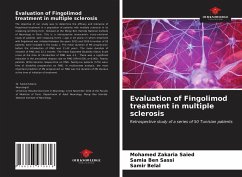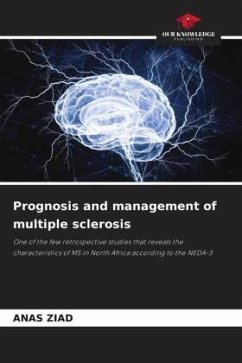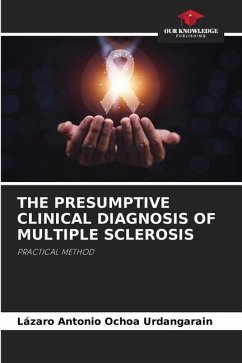
Critical Mediators of Multiple Sclerosis Disease Suppression
Sex, Pregnancy and Estrogen Responsive Genes
Versandkostenfrei!
Versandfertig in 6-10 Tagen
32,99 €
inkl. MwSt.

PAYBACK Punkte
16 °P sammeln!
Multiple sclerosis (MS) is a chronic demyelinating disease of the CNS affecting nearly 3 million people world-wide. Patients present with a myriad of symptoms making MS difficult to diagnose. Clinical presentation of MS ranges from mild to severe, and no two patients can be said to demonstrate the same clinical course. Females are three times as likely as males to be affected, but males often present with a more severe disease course. Pregnancy suppresses MS severity in human and animal models. This is likely due to hormone and genetics regulation of proteins involved with inflammation such as...
Multiple sclerosis (MS) is a chronic demyelinating
disease of the CNS affecting nearly 3 million people
world-wide. Patients present with a myriad of
symptoms making MS difficult to diagnose. Clinical
presentation of MS ranges from mild to severe, and
no two patients can be said to demonstrate the same
clinical course. Females are three times as likely
as males to be affected, but males often present
with a more severe disease course. Pregnancy
suppresses MS severity in human and animal models.
This is likely due to hormone and genetics
regulation of proteins involved with inflammation
such as PI3K proteins. PI3Ks are involved in
cellular trafficking, growth and death. Sex
dimorphism and pregnancy changes have been noted in
both MS and experimental autoimmune
encephalomyelitis, a commonly used animal model for
MS. These models aid in research development and
improve the understanding of immunological processes
of the disease. The studies outlined in this book
offer findings that support therapeutic advancement
for all forms of MS with a thorough investigation of
factors that guide disease susceptibility and
clinical progression.
disease of the CNS affecting nearly 3 million people
world-wide. Patients present with a myriad of
symptoms making MS difficult to diagnose. Clinical
presentation of MS ranges from mild to severe, and
no two patients can be said to demonstrate the same
clinical course. Females are three times as likely
as males to be affected, but males often present
with a more severe disease course. Pregnancy
suppresses MS severity in human and animal models.
This is likely due to hormone and genetics
regulation of proteins involved with inflammation
such as PI3K proteins. PI3Ks are involved in
cellular trafficking, growth and death. Sex
dimorphism and pregnancy changes have been noted in
both MS and experimental autoimmune
encephalomyelitis, a commonly used animal model for
MS. These models aid in research development and
improve the understanding of immunological processes
of the disease. The studies outlined in this book
offer findings that support therapeutic advancement
for all forms of MS with a thorough investigation of
factors that guide disease susceptibility and
clinical progression.












